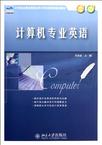计算机专业英语
2012-10
吴丽君 北京大学出版社 (2012-10出版)
吴丽君
269
《21世纪全国应用型本科计算机案例型规划教材:计算机专业英语》按计算机知识结构的层次对计算机科学与技术学科知识进行系统化和科学化的阐述,详细介绍计算机专业基础、专业技术及专业前沿知识,并根据知识点分成12章,分别讲述Intenet基础、操作系统、编程语言、程序设计基础、数据结构和算法、软件工程、数据库系统、网络和Internet、计算机图形和图像、电子商务、人工智能、多媒体专业知识。 书中每一章中都列出了关键词汇,并对一些较难翻译和理解的句子及短语进行了注释,在每一章后面还列出了反映最新技术并且与正文内容相关的一篇阅读材料,以便提高读者阅读计算机英文文献的水平。在每一章的最后给出了练习题,帮助读者巩固所学知识,并附有译文,供读者参考。 《21世纪全国应用型本科计算机案例型规划教材:计算机专业英语》可作为计算机科学与技术专业及相关电子类、信息类专业本科学生的教学用书,也可作为相关领域专业技术人员的参考书。
Chapter 1 Introduction to Computers 1.1 The history of computers 1.2 Hardware concepts and its development 1.2.1 Hardware concepts 1.2.2 Development of computing hardware 1.3 Development of software 1.3.1 The first generation 1.3.2 The second generation 1.3.3 The third generation 1.3.4 The fourth generation 1.4 Reading material: Steve JobsChapter 2 Operating Systems 2.1 The history of operating systems 2.2 The operating system functions 2.2.1 Starting up computers 2.2.2 Loading applications 2.2.3 Controlling of I/O operations 2.2.4 Memory management 2.2.5 File management 2.2.6 Command interpretation 2.3 Modem operating systems 2.3.1 UNIX 2.3.2 Windows XP 2.3.3 Vista 2.3.4 Linux 2.4 Reading material: Windows 7 now available to allChapter 3 Programming Languages. 3.1 Concepts of programming languages 3.2 The history of programming languages 3.3 Components of programming languages 3.3.1 Variables and data types 3.3.2 Constants and literals 3.3.3 Comments 3.3.4 Procedures 3.3.5 Functions 3.4 Reading material: Where C# fits inChapter 4 Programming Fundamentals 4.1 The organization of programming languages 4. l. 1 Programming language factors 4.1.2 Programming language abstractions 4.1.3 Computer language types 4.2 The programming statements 4.3 Object-Oriented programming 4.3.1 Object 4.3.2 Class 4.3.3 Inheritances 4.3.4 Encapsulations 4.3.5 Messages 4.4 Reading material: Java languageChapter 5 Data Structures and Algorithms 5.1 Data structures 5.1.i Stacks 5.1.2 Queues 5.1.3 Trees 5.1.4 Array 5.1.5 List 5.2 The concept of an algorithm 5.2.1 The formal definition of an algorithm 5.2.2 The abstract nature of algorithms 5.3 Algorithm representation 5.3.1 Primitives 5.3.2 Pseudo code 5.4 Common algorithms 5.4.1 Recursion 5.4.2 Sorting 5.4.3 Searching 5.5 Reading material: Sorting algorithmChapter 6 Software Engineering 6. l The history of software engineering 6.2 Software design fundamentals 6.2.1 Stepwise refinement 6.2.2 Abstraction 6.2.3 Software architecture 6.2.4 Data structure 6.2.5 Program structure and modularity 6.2.6 Software procedure 6.2.7 Information hiding 6.2.8 Design representation 6.3 Traditional design methodology 6.4 Modern design methodologies 6.4.1 Object oriented technology 6.4.2 Prototyping 6.5 Tools of modeling 6.5.1 Dataflow diagram 6.5.2 Data dictionary 6.5.3 Unified modeling language 6.6 Reading material: Software development processChapter 7 Database Systems 7.1 The history of databases 7.2 The concepts of databases 7.2.1 The relational mode 7.2.2 The Structured Query Language (SQL) 7.2.3 ACID properties 7.3 Database design 7.3.1 The definitions and concepts 7.3.2 Database normalization 7.4 Database warehousing 7.4.1 Dimensional design 7.4.2 Data warehouse design considerations 7.5 Data mining 7.6 Reading material: Database managementChapter 8 Networking and the Internet 8.1 The networking fundamentals 8.1.1 Network topology 8.1.2 Interface timing 8.1.3 Line configuration 8.1.4 Data interfaces 8.1.5 Network application paradigms 8.2 The World Wide Web 8.2.1 Web implementation 8.2.2 HTML 8.3 The application of the Internet 8.4 Reading material: Network firewallsChapter 9 Computer Graphics and Images 9.1 The fields of computer imagery 9.1.1 Graphics 9.1.2 Image processing 9.1.3 Computer vision 9.2 Steps of image processing operations 9.3 Graphics software 9.3.1 Desktop publishing 9.3.2 Electronic publishing (CD-ROMs and the Internet) 9.4 Animation 9.4.1 Flash 9.4.2 3ds Max 9.5 Reading material: Digital photographyChapter 10 Electronic Commerce 10.1 An introduction to electronic commerce 10.1.1 The difference between traditional business and E-Commerce 10.1.2 The types of E-Commerce 10.1.3 Benefits of E-Commerce 10.2 Electronic payment system 10.2.1 Electronic bank 10.2.2 Electronic funds transfer 10.2.3 Credit cards and smart cards 10.3 E-Commerce security 10.4 Reading material: The criminal incentiveChapter 11 Artificial Intelligence 11.1 An introduction to artificial intelligence 11.2 The goals of artificial intelligence 11.2.1 Acting humanly 11.2.2 Thinking humanly 11.2.3 Thinking rationally 11.2.4 Acting rationally 11.3 The research subjects of AI 11.3.1 Solutions to hard problems 11.3.2 Automatic translation 11.3.3 Intelligent control and intelligent management 11.3.4 Intelligent decision-making 11.3.5 Intelligent simulation 11.3.6 Machine learning 11.4 Expert system 11.5 Reading material: Genetic algorithmChapter 12 Multimedia 12.1 Elements of Multimedia 12.1.1 Text 12.1.2 Audio sound 12.1.3 Static graphics images 12.1.4 Animation 12.2 Multimedia technologies 12.3 Multimedia networking 12.4 Applications of multimedia 12.4.1 Multimedia in business 12.4.2 Multimedia in schools 12.4.3 Multimedia at home 12.4.4 Multimedia in public places 12.4.5 Entertainment 12.4.6 Virtual reality 12.5 Reading material: Microblogging参考文献
吴丽君主编的《计算机专业英语》旨在使计算机专业学生掌握基本的专业英语词汇,熟悉科技英语的基本规律,并提高计算机专业英语文献的阅读能力。 本书以计算机科学文章为主,共分为12章,介绍了计算机技术各方面的内容,包括计算机基础、操作系统、编程语言、程序设计基础、数据结构和算法、软件工程、数据库系统、网络和Internet、计算机图形和图像、电子商务、人工智能、多媒体专业知识。本书的特点是内容和专业词汇的涵盖面广,实用性和专业性相结合,注重应用型本科人才的培养,有助于改善教师的教学效果和学生的学习效果。通过对本书内容的学习,学生能掌握大量的科技和专业词汇,基本上能看懂计算机专业硬件、软件、应用等方面的专业资料,能比较流畅地阅读计算机及其零部件的说明书,理解各种软件的操作提示和帮助信息。

书不错 就是译文和原文相距太远 英语不好看着很费劲
只是很全面 和计算机衔接的很好 很有帮助
书也不错吧 但有些细节部分错的比如说 c语言设计者的名字 还有不是只有里奇一人吗如果说还有一人的话就是汤姆吧